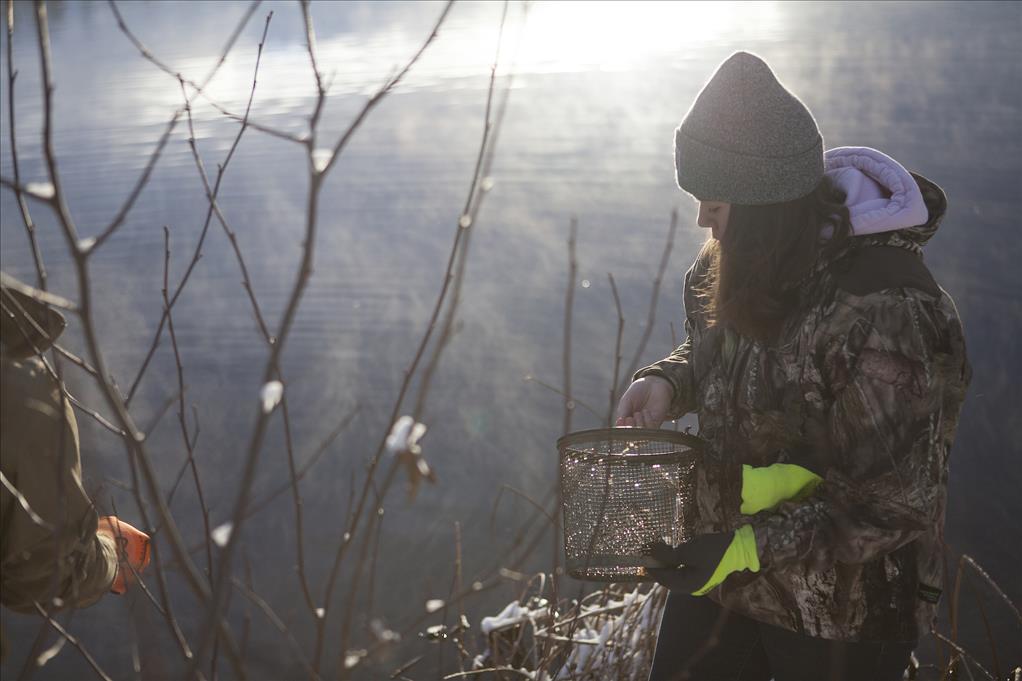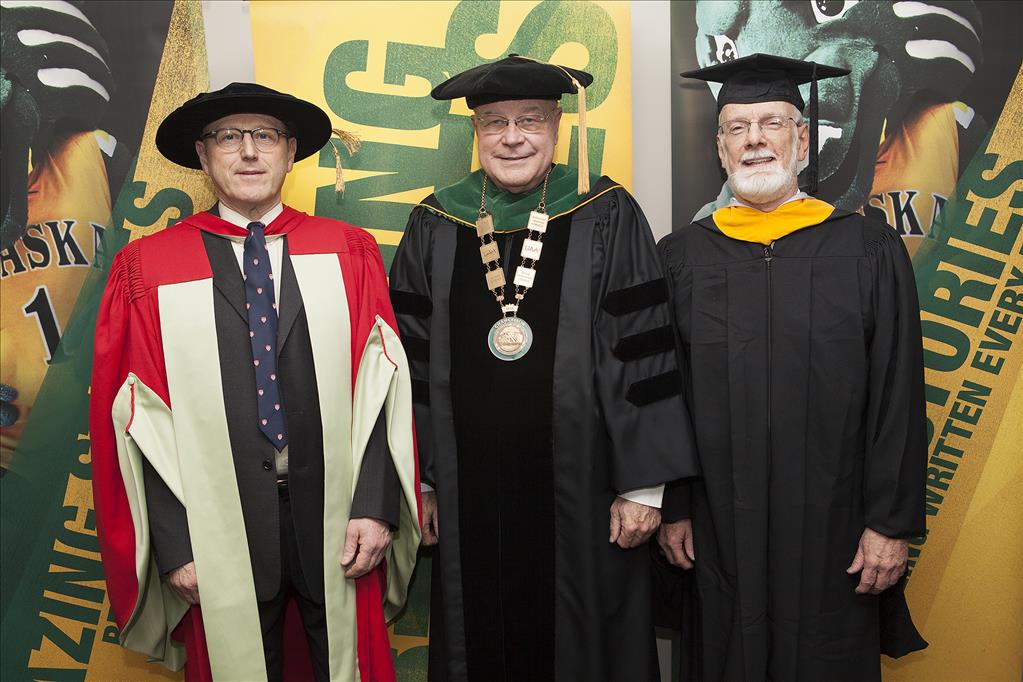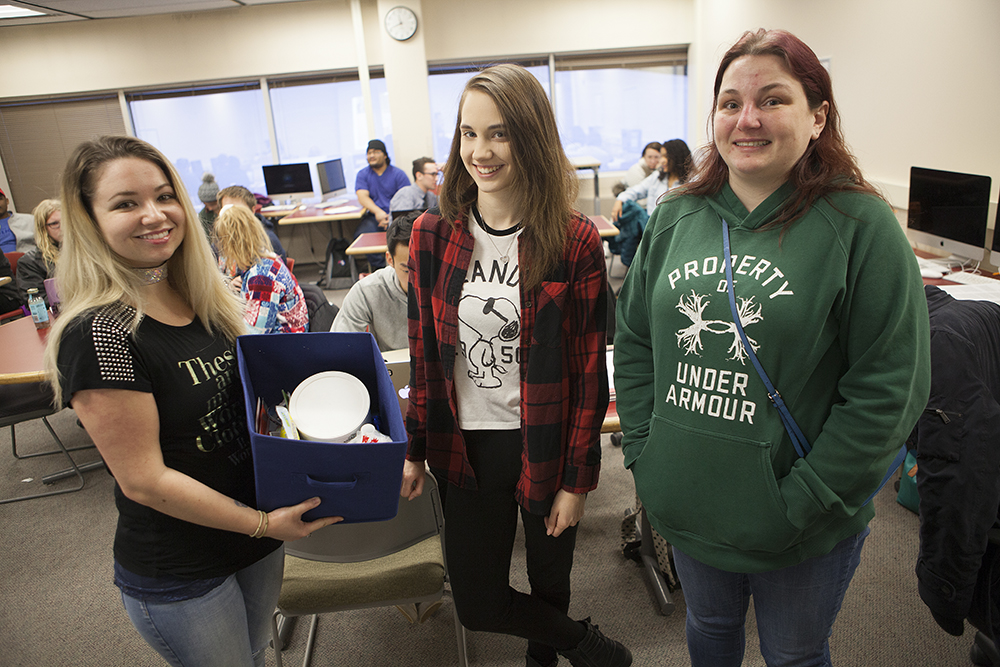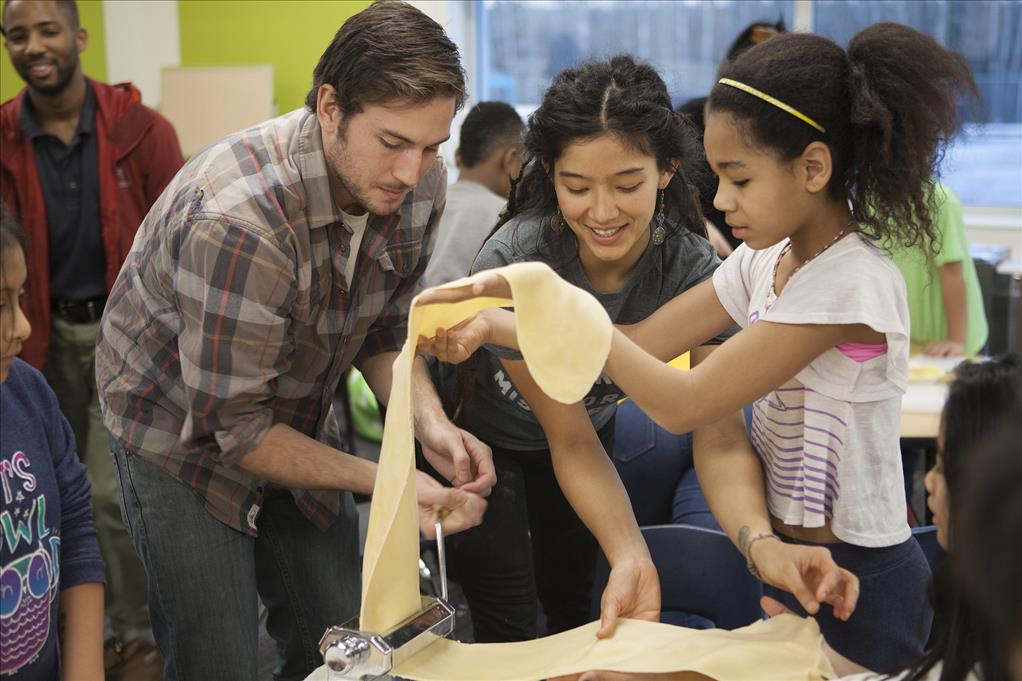Q-and-A with 'Stalking the Bogeyman' director
by Kathleen McCoy |

Brian Cook is directing 'Stalking the Bogeyman.' (Photo by Ted Kincaid / University of Alaska Anchorage)
Campus during spring semester is wildly busy. Six weeks out from graduation, seniors are jamming on capstone projects. Term paper deadlines and finals loom just ahead. Undergraduates organize campus conferences to showcase their research. The energy level is palpable.
Over in UAA's Fine Arts Building, the theatre faculty and students have worked hard on an ambitious endeavor-staging the first West Coast production of "Stalking the Bogeyman," based on Alaska journalist David Holthouse's story of childhood rape.
The play runs through April 24 in the 80-seat Harper Studio Theatre, but planning and collaboration have been ongoing for months. By late March, work is at fever pitch.
The play's topic, child sexual abuse, is relevant. Alaska has one of the top five rates in the United States. Theatre and psychology professors and community partners are collaborating to use the play as a way into community dialogue. Each performance has a talk back session with the director and actors, but also guests, like the playwright and community health experts. The production will tour several Alaska communities this summer, including Mat-Su, Homer, Seward, Valdez and Fairbanks.
The ambition and expectations are big. This week, I sought out director Brian Cook to check in on progress. He's new to UAA this year, with a master's from the Royal Academy of Dramatic Arts, King's College, London, and a doctorate from the University of Oregon. His research interests are contemporary British theatre, alternative theatre, crime drama and indigenous drama.
Here is some of what he had to say about directing Stalking the Bogeyman.
Q: I learned from interviewing actors in the play that the script for Bogeyman is still changing. Theatre students say this is particularly invigorating, a real shift from their normal experience. How do you direct a script that is still changing?
Cook: The play hasn't been published yet. For every script in the world, the process is the same. Someone writes a play. At readings, the writer hears what's working and what
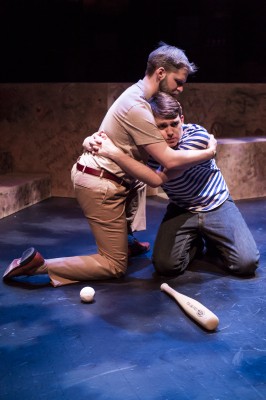
In a scene from 'Stalking the Bogeyman,' character David embraces his father. (Photo by OHara Shipe/UAA)
isn't. Then the play gets a workshop production so actors can work on characters and the playwright can watch and adjust. It may continue to change for a while. Then it finally gets published and that's the set text.
For this one, part of what's different is they have a director who is not one of the writers. Markus Potter wrote and directed it, and knew exactly what he was thinking. I don't have that access...And sometimes it's just David [Holthouse] or Markus realizing something, like 'That word has always bothered me.' At some point, they have a brainstorm and think of what it should be instead. I get those notes too.
Q: I heard the play lost a whole character and added a new one?
Cook: That's the biggest change the actors saw between auditions and when we started rehearsing the show. That does not happen all that often. Originally David has a psychiatrist he would go to and talk through his problems. So some of the exposition about the other guy being in town and the stalking would come out in those conversations.
Between David and Markus, since the last production, they both decided they wanted to make David seem more impacted by the things that has happened to him. To make him less like a hero. I mean the question of him shooting the Bogeyman is a question of heroics anyway. But instead of the psychiatrist, he visits a friend who sells him drugs. We don't see David take drugs, but we know he is because he goes to [new character] Molly's house and buys them from her, and while he is there he has conversations similar to what he used to have with the psychiatrist.
It does give David a different kind of character, but I embrace the change. Obviously David comes off well in the play. He is the character everyone sympathizes with and that is intentionally so. But it is good to have things about him that are not genuine and true and pure. ...I think that makes more sense than this heroic person who doesn't have any outward signs of issues, who all of a sudden has all this anger. Now, you can see this manifestation of what is going on under the surface before we hear him wanting to kill somebody.
Q: Actor David in the play has met playwright David. How does that work?
Cook: One of the things you do with a play that has a biographical basis is decide how far do we need to go at recreating real life. A lot of the play is based on the story that David Holthouse wrote originally. A lot of things are not based on that story. He talks about certain moments in the play, and we see some of those moments. But there has
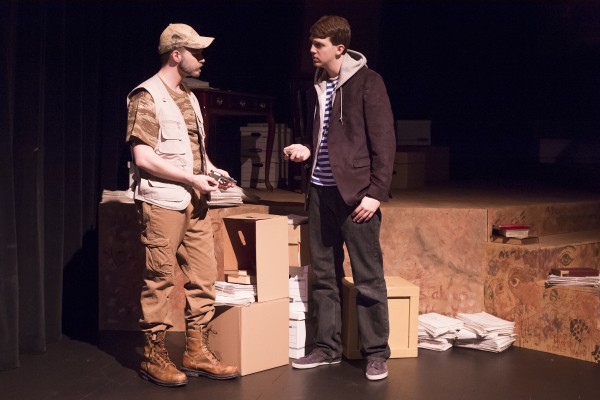
Character David considrs buying a weapon to shoot the Bogeyman. (Photo by OHara Shipe/IUAA)
also been some fictionalizing... At some point the play stops being entirely true to real life and becomes something else.
The actor has to decide why the character makes this choice or that choice. Because David Holthouse is accessible to us, the actor could just ask the real David why he did things. ... And I said no. I want the actor to find the answer in himself. Ultimately I think it will be more interesting if the choices in the play that the character makes come from what the actor's choices are. Based on research they do into that person's life, or things that are connected to their own life. Whatever that is, it is more important for the actor to make those choices.
There is a famous adage, sort of an apocryphal story, which I am sure is true, about the movie Marathon Man. Dustin Hoffman and Sir Lawrence Olivier are in it, playing opposite each other. Hoffman is doing all this activity and being really active-drinking coffee and getting himself psyched up to play the scene. Olivier asks him, "Why are you doing all those things?" And Hoffman says, "I have to be really really emotionally raw in this scene and so I am doing all these things to make myself that way." And supposedly Sir Lawrence says, "Have you ever tried acting, my dear boy?"
If we really wanted true authentic activity, we would cast David Holthouse in the role of David in the play. But that is not what we have been given to do.
Q: How did you and the playwrights communicate about these changes?
Cook: Markus (Potter) was here for the first week of rehearsal. We have a connection by phone and email, no Skyping in to rehearsals or anything like that. David (Holthouse) has seen two or three readings of the script. We debated, or I did, at the beginning, on where we fall on the line. How much do we invite the playwrights in versus not. It was easy with Markus because he's out of town. Trickier with David, because he is in town. But he also has his own life. How many times do we want to ask him to relive this? Every time he comes to the show, he is both the writer and the person this happened to.
Overall, I think we've struck the right balance. His life is busy and he is perfectly happy to let us do the thing. He will come see the show and be a part of talk backs. He does not hover, and he's been supportive of the choices we've made.
Q: How did the directing task fall to you? Did you volunteer for it?
Cook: They were going through the hiring process last year when they knew they would do this production. I guess it was a leap of faith that they would find the right person.
When I interviewed, I talked about my background as an undergraduate. A friend and I started a small theatre company that continued up until about 2006. Periodically we would dust off a play she had written about sexual assault. We took it to universities and service organizations and performed it as a kind of educational piece. It always went along with talk backs and small group discussions.
I have seen audience response to a piece like this....In that play, we did a fight scene, and the fight part of the rape is simulated. I watched the audience go through that moment. What they talked about after gave me a sense of what to expect from the audience with this play. Always, people have emotional responses to it, but never have I had, 'How dare you do this play!' Even people who are triggered by it understand how important it is that these kinds of plays happen-both for survivors as well as people who believe they have no connection to it. The play provides an important space that says 'this happens.'
Q: What sorts of questions come up in the talk back?
Cook: Often there is a very lovely space afterward, when people thank the cast and crew for putting this kind of story into the world, and for giving the space for survivors to say

In a scene from 'stalking the Bogeyman,' character David embraces his father. (Photo by OHara Shipe/UAA)
what happened to them, but also that they made it through.
Responses that stick with me from the college campuses where we did our company production were men, having watched the show, saying 'Wow, this is what it's like on the other side of that.' Not that these men had raped anyone, but they had never given that any consideration. For men, sex is just sex. Well, not always. When there is no consent, you feel like all your personal power has been taken from you. There is an emotional impact, and a physical impact. It's good to see people realize they had no clue how devastating two minutes in someone's life can be.
People without a lot of experience tend to ask a lot of questions. Some are appropriate and some are not. A lot of times, people want to ask the actors, 'Has this happened to you?' I feel that is inappropriate. If an actor chooses to say 'this happened to me,' that's one thing. That is anyone's choice. But it shouldn't be the result of a question. So those I deflect.
Because this play is about children, I expect questions from parents about 'How do I keep my kid safe.' That's the work of our community partners to provide us with good information that we can share, and they will also be part of the talk backs.
Q: What engages you as the director?
Cook: I want to make sure that I am telling the story that honors David's story-this happened and he opened it to the world in print and a play. I want the story to come through clearly. I want to make sure the audience gets the experience they need to get. Which is: I am not painting David like a complete saint. And I am not painting the Bogeyman like this evil horrible awful person. There are questions to be asked: Is this the only time the Bogeyman did this? Is David making the right choice by wanting to kill him?
It would be easy to make this into a melodrama in which David is the hero and he is beset upon by this horrible person. But that is not what David has written as a story or as a play. And it is also not what we experience as human beings. We experience lots of shades of gray. Every time I direct the basement scene between David and the Bogeyman where the rape actually happens. They play with Ninja weapons. In certain moments the Bogeyman is nice to David, and in other moments, he is not. I fiddle with that scene a lot. I fiddle more with the Bogeyman, partially because I want to get the Bogeyman right. I want to get the right balance of - we think he's lying about this being the only time. We want it to seem like he's planned this, potentially done it before, without it seeming over rehearsed.
I tend to fiddle with the Bogeyman more, because David is clear to us. He told us his story. We don't have the Bogeyman's perspective, we don't know why he did what he did. Later, why does he walk into a conversation and admit guilt? How does he benefit? He gets to walk away, but not really free. What is in it for him in saying what he says to David. Why was it David he chooses? So many questions about him, they are driving us a lot.
Q: Last thoughts on the production?
Cook: I hope the audience recognizes there is a tremendous amount of bravery that all of the actors have, regardless of whether they play David, the Bogeyman, or the two sets of parents. A lot of emotion and energy and stress has gone into playing these roles.
To be honest, the Bogeyman, I worry about that actor. He is the one I want to protect the most. In my experience, audiences tend to conflate the character and the actor, especially if the actor is not well known. If Julia Roberts plays a villain, we know she's not the villain. That's why I have the actors come out in their street clothes, not their costumes. They can introduce themselves to the audience and talk about themselves.
Somewhere, I hope someone says thank you for being the one who has to play that role. None of the roles are easy, but that is the hardest one.
Compiled by Kathleen McCoy, UAA Office of University Advancement
 "Q-and-A with 'Stalking the Bogeyman' director" is licensed under a Creative Commons Attribution-NonCommercial 4.0 International License.
"Q-and-A with 'Stalking the Bogeyman' director" is licensed under a Creative Commons Attribution-NonCommercial 4.0 International License.










